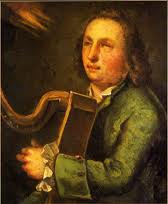Annotation:Lady Athenry: Difference between revisions
No edit summary |
m (Text replacement - "garamond, serif" to "sans-serif") |
||
| Line 1: | Line 1: | ||
'''Back to [[{{BASEPAGENAME}}]]''' | '''Back to [[{{BASEPAGENAME}}]]''' | ||
---- | ---- | ||
<p><font face=" | <p><font face="sans-serif" size="4"> | ||
'''LADY ATHENRY.''' AKA - "Planxty Lady Athenry." Irish, Air or Planxty (6/8 time, "lively"). G Major. Standard tuning (fiddle). AB. Composed by Turlough O'Carolan (1670-1738). Collector George Petrie thought this composition, of all of Carolan's work, showed the most influence of Corelli and the Italian composers. O'Sullivan (1958) determines that the subject of the air is Lady Mary Nugent (1694-1725), eldest daughter of Thomas, 4th Earl of Westmeath, who married Francis Bermingham, 21st Baron of Athenry, in September, 1716. O'Sullivan gives a history of the Bermingham's, who were descended from a knight commander in Strongbow's Norman invasion of Ireland in 1170. | '''LADY ATHENRY.''' AKA - "Planxty Lady Athenry." Irish, Air or Planxty (6/8 time, "lively"). G Major. Standard tuning (fiddle). AB. Composed by Turlough O'Carolan (1670-1738). Collector George Petrie thought this composition, of all of Carolan's work, showed the most influence of Corelli and the Italian composers. O'Sullivan (1958) determines that the subject of the air is Lady Mary Nugent (1694-1725), eldest daughter of Thomas, 4th Earl of Westmeath, who married Francis Bermingham, 21st Baron of Athenry, in September, 1716. O'Sullivan gives a history of the Bermingham's, who were descended from a knight commander in Strongbow's Norman invasion of Ireland in 1170. | ||
[[File:carolan.jpg|200px|thumb|left|Turlough O'Carolan]] | [[File:carolan.jpg|200px|thumb|left|Turlough O'Carolan]] | ||
| Line 7: | Line 7: | ||
<br> | <br> | ||
</font></p> | </font></p> | ||
<p><font face=" | <p><font face="sans-serif" size="4"> | ||
''Source for notated version'': John & William Neal's c. 1721 collection of Carolan compositions [O'Sullivan]. The title is missing from the extent copy of the collection, which was published in Dublin. | ''Source for notated version'': John & William Neal's c. 1721 collection of Carolan compositions [O'Sullivan]. The title is missing from the extent copy of the collection, which was published in Dublin. | ||
<br> | <br> | ||
<br> | <br> | ||
</font></p> | </font></p> | ||
<p><font face=" | <p><font face="sans-serif" size="4"> | ||
''Printed sources'': O'Neill ('''Music of Ireland: 1850 Melodies'''), 1903; No. 686, p. 125. O'Sullivan ('''Carolan: The Life, Times and Music of an Irish Harper'''), 1958; No. 1, p. 103. | ''Printed sources'': O'Neill ('''Music of Ireland: 1850 Melodies'''), 1903; No. 686, p. 125. O'Sullivan ('''Carolan: The Life, Times and Music of an Irish Harper'''), 1958; No. 1, p. 103. | ||
<br> | <br> | ||
<br> | <br> | ||
</font></p> | </font></p> | ||
<p><font face=" | <p><font face="sans-serif" size="4"> | ||
''Recorded sources'': <font color=teal></font> | ''Recorded sources'': <font color=teal></font> | ||
</font></p> | </font></p> | ||
Latest revision as of 14:10, 6 May 2019
Back to Lady Athenry
LADY ATHENRY. AKA - "Planxty Lady Athenry." Irish, Air or Planxty (6/8 time, "lively"). G Major. Standard tuning (fiddle). AB. Composed by Turlough O'Carolan (1670-1738). Collector George Petrie thought this composition, of all of Carolan's work, showed the most influence of Corelli and the Italian composers. O'Sullivan (1958) determines that the subject of the air is Lady Mary Nugent (1694-1725), eldest daughter of Thomas, 4th Earl of Westmeath, who married Francis Bermingham, 21st Baron of Athenry, in September, 1716. O'Sullivan gives a history of the Bermingham's, who were descended from a knight commander in Strongbow's Norman invasion of Ireland in 1170.

Source for notated version: John & William Neal's c. 1721 collection of Carolan compositions [O'Sullivan]. The title is missing from the extent copy of the collection, which was published in Dublin.
Printed sources: O'Neill (Music of Ireland: 1850 Melodies), 1903; No. 686, p. 125. O'Sullivan (Carolan: The Life, Times and Music of an Irish Harper), 1958; No. 1, p. 103.
Recorded sources:
Back to Lady Athenry
